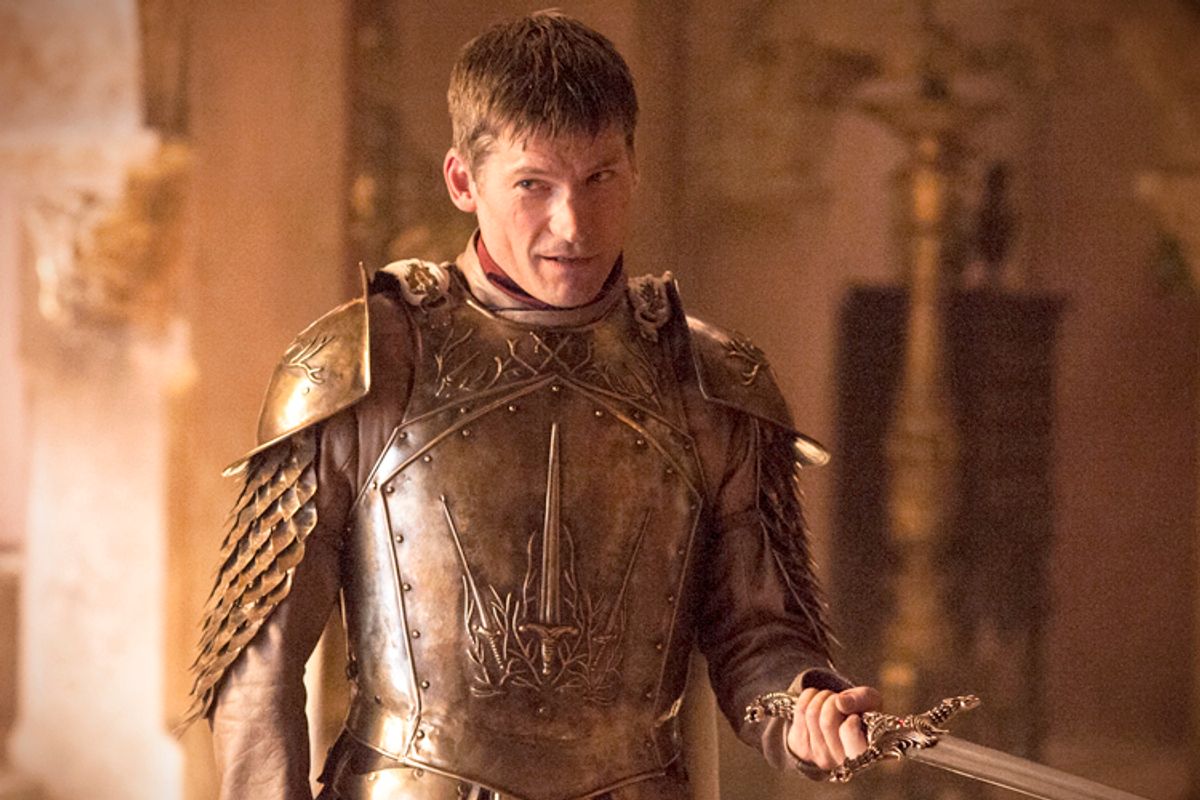"The scene was always intended to be disturbing," says George R.R. Martin, "but I do regret if it has disturbed people for the wrong reasons." In a brief response on his own blog this week, the author has addressed the recent uproar over Cersei's shocking rape by her brother and lover Jaime on Sunday's episode of "Game of Thrones" – a plot twist very different from the narrative in his own books. And, boy, did it disturb, all right.
In it, siblings Jaime and Cersei are sharing a moment with the body of their murdered son Joffrey that turns swiftly from grief to ardor to anger to, ultimately, rape. For a show that's already featured incest, torture, amputation, rape galore and at least two monster baby births, you'd think a little brother on sister sexual assault might not have raised so many eyebrows. It's not that the scene wasn't unnerving; but in the context of a series that's featured a Herod-like child massacre, within an episode that features another character bragging to a little boy, "I’m going to eat your dead mama, and I’m going to eat your dead papa," what happened Sunday between the maimed Jaime and Cersei was not exactly an atypical event. Yet the sudden and violent turn, from a character who, OK, sure, pushed a kid out a window in the first episode but has taken a more humbling road in his subsequent narrative arc, provoked a more powerful reaction than almost anything the show has done in its entire button-pushing run. Writing in Salon Monday, Roxane Gay called the scene "sensationalized rape" and said, "The show, and the books, reveal the disturbing and cavalier facility with which rape becomes a narrative device." Jezebel called the scene "some despicable shit" and on Vulture, Margaret Lyons called it "a new low for the deeply violent series."
Much of the controversy stems from the fact that what happens between Jaime and Cersei plays out very differently in Martin's book – Cersei initially protests but quickly consents, telling him, "Yes my brother, sweet brother, yes." Further upsetting many viewers has been the way the show's own participants have chosen to frame the event. Director Alex Graves has said that "It becomes consensual by the end, because anything for them ultimately results in a turn-on, especially a power struggle," and actor Nikolaj Coster-Waldau has described it as, "Everything here is extreme. That scene is extreme. The emotions, everything is just messed up, and then he just wants to reconnect and becomes that weird thing ... We tried to have it where she goes into it then she pulls away, she goes in then she pulls away, but of course he is forcing himself." In his blog post, Martin seems to have gently backed away from the controversy, saying, "The whole dynamic is different in the show, where Jaime has been back for weeks at the least, maybe longer, and he and Cersei have been in each other's company on numerous occasions, often quarreling. The setting is the same, but neither character is in the same place as in the books, which may be why Dan & David played the sept out differently. But that's just my surmise; we never discussed this scene, to the best of my recollection. Also, I was writing the scene from Jaime's POV, so the reader is inside his head, hearing his thoughts. On the TV show, the camera is necessarily external. You don't know what anyone is thinking or feeling, just what they are saying and doing."
There's no denying that "Game of Thrones" has long gone down some incredibly messed-up roads. Its depiction of race is unsophisticated, to say the least; it's repeatedly veered into torture porn turf (what it's done to Theon alone could make the Jigsaw killer cry uncle) and it had already proven itself more than generous in its depiction of sexual violence toward women long before Jaime brutalized Cersei. But what's made that particular scene so galvanizing has been the director's suggestion of ambiguity and the sucker punch of such a harrowing moral reversal for a character who'd of late been struggling toward redemption.
It's well-documented by now that rape as a dramatic device to move a television series forward is an overused trope. And the audience's sense of betrayal that Jaime would, at this stage in his development, commit such an act is understandable. Jaime is a character viewers have become emotionally invested in, unlike, say, Craster, who spent the better part of Seasons 2 and 3 raping his daughters and murdering his sons without inspiring a whole lot of "What does it all mean?" think pieces. Yet in the lurid world of "GOT," where an episode without a disemboweling would be like "Sex and the City" without cocktails, this scene is thematically consistent. " There's no question what Jaime did to Cersei was rape – though, given the dark and twisted dynamic of their relationship, viewers may have to brace for a stickier emotional fallout in the weeks to come. But the entire show is built on the notion that no one is ever safe, and any character is capable of profound darkness. Both Sansa's and Arya's story lines in Sunday's very same episode were about trust and betrayal, and Littlefinger's cool reminder that "We're all liars here" could be the motto of the whole "Games of Thrones" realm. No one's hands are ever clean, however many hands a character may have. Welcome to Westeros.



Shares